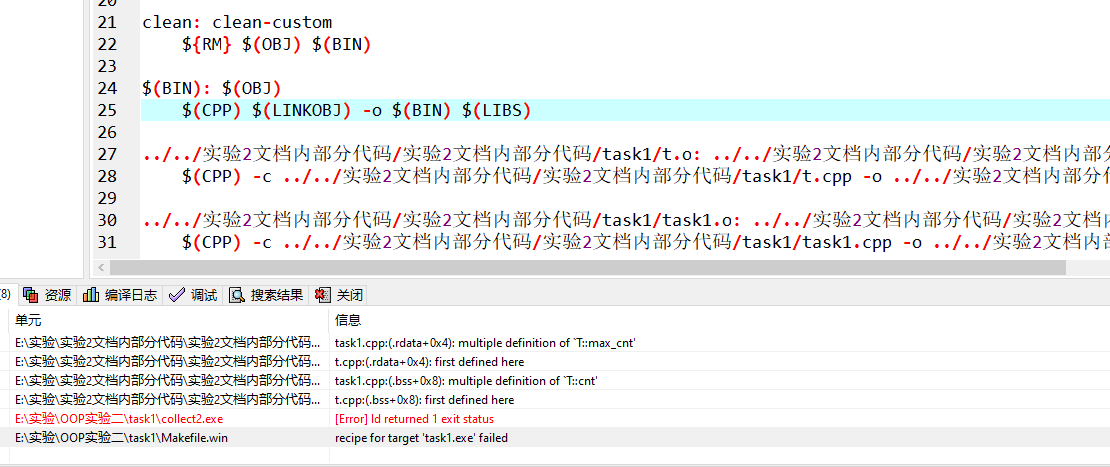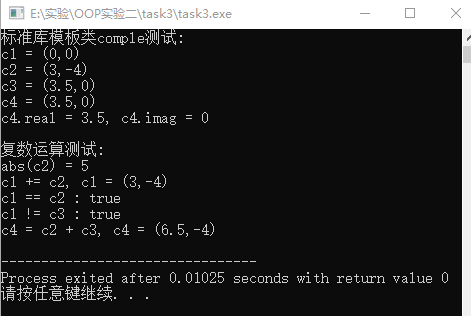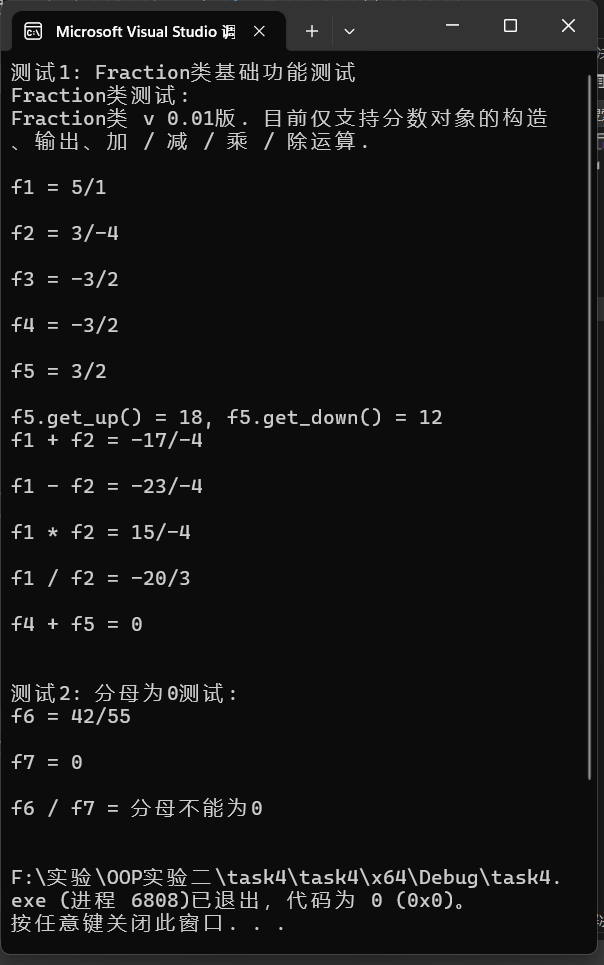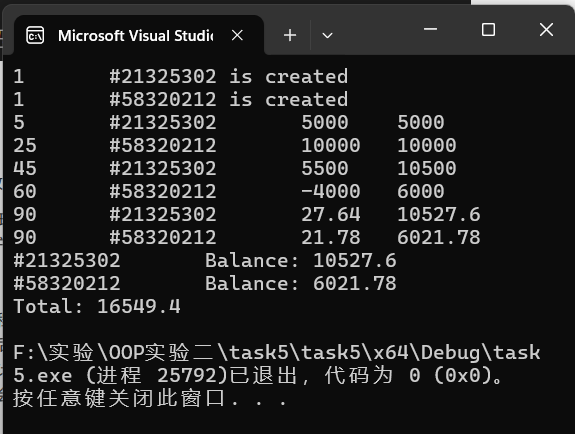实验2 类和对象_基础编程1
task 1:
t.h:
#pragma once #include <string> // 类T: 声明 class T { // 对象属性、方法 public: T(int x = 0, int y = 0); // 普通构造函数 T(const T &t); // 复制构造函数 T(T &&t); // 移动构造函数 ~T(); // 析构函数 void adjust(int ratio); // 按系数成倍调整数据 void display() const; // 以(m1, m2)形式显示T类对象信息 private: int m1, m2; // 类属性、方法 public: static int get_cnt(); // 显示当前T类对象总数 public: static const std::string doc; // 类T的描述信息 static const int max_cnt; // 类T对象上限 private: static int cnt; // 当前T类对象数目 // 类T友元函数声明 friend void func(); }; // 普通函数声明 void func();
t.cpp:
// 类T: 实现 // 普通函数实现 #include "t.h" #include <iostream> #include <string> using std::cout; using std::endl; using std::string; // static成员数据类外初始化 const std::string T::doc{"a simple class sample"}; const int T::max_cnt = 999; int T::cnt = 0; // 对象方法 T::T(int x, int y): m1{x}, m2{y} { ++cnt; cout << "T constructor called.\n"; } T::T(const T &t): m1{t.m1}, m2{t.m2} { ++cnt; cout << "T copy constructor called.\n"; } T::T(T &&t): m1{t.m1}, m2{t.m2} { ++cnt; cout << "T move constructor called.\n"; } T::~T() { --cnt; cout << "T destructor called.\n"; } void T::adjust(int ratio) { m1 *= ratio; m2 *= ratio; } void T::display() const { cout << "(" << m1 << ", " << m2 << ")" ; } // 类方法 int T::get_cnt() { return cnt; } // 友元 void func() { T t5(42); t5.m2 = 2049; cout << "t5 = "; t5.display(); cout << endl; }
task1.cpp:
#include "t.h" #include <iostream> using std::cout; using std::endl; void test(); int main() { test(); cout << "\nmain: \n"; cout << "T objects'current count: " << T::get_cnt() << endl; } void test() { cout << "test class T: \n"; cout << "T info: " << T::doc << endl; cout << "T objects'max count: " << T::max_cnt << endl; cout << "T objects'current count: " << T::get_cnt() << endl << endl; T t1; cout << "t1 = "; t1.display(); cout << endl; T t2(3, 4); cout << "t2 = "; t2.display(); cout << endl; T t3(t2); t3.adjust(2); cout << "t3 = "; t3.display(); cout << endl; T t4(std::move(t2)); cout << "t3 = "; t4.display(); cout << endl; cout << "T objects'current count: " << T::get_cnt() << endl; func(); }
运行结果:

问题一:

不能,可能是因为friend只是声明名为func的函数为友元,并没有声明func函数,去掉36行的func的声明后程序中就没有对func函数的声明了。
问题二:
1.复制构造函数
1.功能
1.用于创建一个新对象,该新对象是另一个同类型对象的副本。它会将源对象的每个数据成员的值复制到新创建的对象中。
2.调用时机
1.当用一个已存在的对象初始化一个新对象时调用;当对象作为函数参数按值传递时调用;当函数返回一个对象时调用(返回值优化可能会避免这种调用,但在某些情况下仍然会发生)。
2.移动构造函数
1.功能
1.移动构造函数用于将资源(如动态分配的内存)从一个对象转移到另一个对象,而不是进行昂贵的复制操作。它通常会“窃取”源对象的资源,然后将源对象置于一种可析构的安全状态(例如将指针成员设为nullptr)。
2.调用时机
1.当用一个临时对象(右值)初始化一个新对象时调用;在使用std::move将左值转换为右值后,用这个转换后的右值初始化新对象时调用。
3.参数带默认值的普通构造函数
1.功能
1.用于创建对象并初始化对象的成员变量。如果构造函数的参数有默认值,那么在创建对象时,可以根据需要选择提供部分或全部参数,未提供的参数将使用默认值进行初始化。
2.调用时机
1.当创建对象时调用。
4.析构函数
调用时机
1.当对象超出其作用域时调用;当使用delete操作符显式删除动态分配的对象时调用。
问题三:

不能运行
task 2:
Complex.h
#include<iostream> using namespace std; class Complex { public: static string doc; Complex(double x=0,double y=0):r{x},i{y}{} Complex(const Complex& p) { r = p.r; i = p.i; } double get_real() { return r; } double get_imag() { return i; } void add(const Complex& p) { r += p.r; i += p.i; } friend Complex add(const Complex& p, const Complex& q); friend bool is_equal(const Complex& p, const Complex& q); friend bool is_not_equal(const Complex& p, const Complex& q); friend void output(const Complex& p); friend double abs(const Complex& p); private: double r, i; };
Complex.cpp:
#include<iostream> #include<cmath> #include"1.hpp" string Complex::doc = " a simplified complex class"; Complex add(const Complex& p, const Complex& q) { Complex c; c.i = p.i + q.i; c.r = p.r + q.r; return c; } bool is_equal(const Complex& p, const Complex& q) { return (p.i == q.i && p.r == q.r); } bool is_not_equal(const Complex& p, const Complex& q) { return (p.i != q.i || p.r != q.r); } void output(const Complex& p) { if(p.i<0)cout << p.r << p.i << "i" << endl; else cout << p.r << "+" << p.i << "i" << endl; } double abs(const Complex& p) { double t; t = p.i * p.i + p.r * p.r; return std::sqrt(t); }
task2.cpp:
#include <iostream> #include"1.hpp" using std::cout; using std::endl; using std::boolalpha; void test() { cout << "类成员测试: " << endl; cout << Complex::doc << endl; cout << endl; cout << "Complex对象测试: " << endl; Complex c1; Complex c2(3, -4); const Complex c3(3.5); Complex c4(c3); cout << "c1 = "; output(c1); cout << endl; cout << "c2 = "; output(c2); cout << endl; cout << "c3 = "; output(c3); cout << endl; cout << "c4 = "; output(c4); cout << endl; cout << "c4.real = " << c4.get_real() << ", c4.imag = " << c4.get_imag() << endl; cout << endl; cout << "复数运算测试: " << endl; cout << "abs(c2) = " << abs(c2) << endl; c1.add(c2); cout << "c1 += c2, c1 = "; output(c1); cout << endl; cout << boolalpha; cout << "c1 == c2 : " << is_equal(c1, c2) << endl; cout << "c1 != c3 : " << is_not_equal(c1, c3) << endl; c4 = add(c2, c3); cout << "c4 = c2 + c3, c4 = "; output(c4); cout << endl; } int main() { test(); }
运行结果:

task3:
代码如下:
#include <iostream> #include <complex> using std::cout; using std::endl; using std::boolalpha; using std::complex; void test() { cout << "标准库模板类comple测试: " << endl; complex<double> c1; complex<double> c2(3, -4); const complex<double> c3(3.5); complex<double> c4(c3); cout << "c1 = " << c1 << endl; cout << "c2 = " << c2 << endl; cout << "c3 = " << c3 << endl; cout << "c4 = " << c4 << endl; cout << "c4.real = " << c4.real() << ", c4.imag = " << c4.imag() << endl; cout << endl; cout << "复数运算测试: " << endl; cout << "abs(c2) = " << abs(c2) << endl; c1 += c2; cout << "c1 += c2, c1 = " << c1 << endl; cout << boolalpha; cout << "c1 == c2 : " << (c1 == c2) << endl; cout << "c1 != c3 : " << (c1 != c3) << endl; c4 = c2 + c3; cout << "c4 = c2 + c3, c4 = " << c4 << endl; } int main() { test(); }
运行结果:

task4:
Fraction.h:
#pragma once #include<iostream> using namespace std; class Fraction { public: static string Doc; Fraction(int u, int d = 1) :up{ u }, down{ d } {} Fraction(const Fraction& f) { up = f.up; down = f.down; } int get_up() { return up; } int get_down() { return down; } Fraction negative() { Fraction f(1); if (down < 0) { f.up = up; f.down = 0 - down; return f; } else { f.up = 0 - up; f.down = down; return f; } } friend void output(const Fraction& f); friend Fraction add(const Fraction& a, const Fraction& b); friend Fraction sub(const Fraction& a, const Fraction& b); friend Fraction mul(const Fraction& a, const Fraction& b); friend Fraction div(const Fraction& a, const Fraction& b); private: int up, down; }; void output(const Fraction& f); Fraction add(const Fraction& a, const Fraction& b); Fraction sub(const Fraction& a, const Fraction& b); Fraction mul(const Fraction& a, const Fraction& b); Fraction div(const Fraction& a, const Fraction& b);
Fraction.cpp:
#include<iostream> #include"Fraction.h" using namespace std; string Fraction::Doc = "Fraction类 v 0.01版. 目前仅支持分数对象的构造、输出、加 / 减 / 乘 / 除运算."; void output(const Fraction& f) { int x, y,c,d, m = 0; c = f.up; d = f.down; if (c <= 0)x = -1 * c; else x = c; if (d <= 0)y = -1 * d; else y = d; for (int i = x; (i * i) >= x && x != 0&&y != 0; i--) { if (x % i == 0) { if (y % i == 0 && i > m)m = i; else if ((x / i) > m && y % (x / i) == 0)m = x / i; } } if(m)c = c / m, d = d / m; if (d) { if (c)cout << c << "/" << d << endl; else cout <<"0" << endl; } else cout << "分母不能为0" << endl; } Fraction add(const Fraction& a, const Fraction& b) { int x, y, c, d, m = 0; Fraction f(1); c = a.up * b.down+ b.up * a.down; d = a.down * b.down; if (c <= 0)x = -1 * c; else x = c; if (d <= 0)y = -1 * d; else y = d; for (int i = x; (i * i) >= x && x != 0 && y != 0; i--) { if (x % i == 0) { if (y % i == 0 && i > m)m = i; else if ((x / i) > m && y % (x / i) == 0)m = x / i; } } if (m)c = c / m, d = d / m; f.up = c; f.down = d; return f; } Fraction sub(const Fraction& a, const Fraction& b) { int x, y, c, d, m = 0; Fraction f(1); c = a.up * b.down - b.up * a.down; d = a.down * b.down; if (c <= 0)x = -1 * c; else x = c; if (d <= 0)y = -1 * d; else y = d; for (int i = x; (i * i) >= x && x != 0 && y != 0; i--) { if (x % i == 0) { if (y % i == 0 && i > m)m = i; else if ((x / i) > m && y % (x / i) == 0)m = x / i; } } if (m)c = c / m, d = d / m; f.up = c; f.down = d; return f; } Fraction mul(const Fraction& a, const Fraction& b) { int x, y, c, d, m = 0; Fraction f(1); c = a.up * b.up; d = a.down * b.down; if (c <= 0)x = -1 * c; else x = c; if (d <= 0)y = -1 * d; else y = d; for (int i = x; (i * i) >= x && x != 0 && y != 0; i--) { if (x % i == 0) { if (y % i == 0 && i > m)m = i; else if ((x / i) > m && y % (x / i) == 0)m = x / i; } } if (m)c = c / m, d = d / m; f.up = c; f.down = d; return f; } Fraction div(const Fraction& a, const Fraction& b) { int x, y, c, d, m = 0; Fraction f(1); c = a.up * b.down; d = a.down * b.up; if (c <= 0)x = -1 * c; else x = c; if (d <= 0)y = -1 * d; else y = d; for (int i = x; (i * i) >= x && x != 0 && y != 0; i--) { if (x % i == 0) { if (y % i == 0 && i > m)m = i; else if ((x / i) > m && y % (x / i) == 0)m = x / i; } } if (m)c = c / m, d = d / m; f.up = c; f.down = d; return f; }
task4.cpp:
#include "Fraction.h" #include <iostream> using std::cout; using std::endl; void test1() { cout << "Fraction类测试: " << endl; cout << Fraction::Doc << endl << endl; Fraction f1(5); Fraction f2(3, -4), f3(-18, 12); Fraction f4(f3); cout << "f1 = "; output(f1); cout << endl; cout << "f2 = "; output(f2); cout << endl; cout << "f3 = "; output(f3); cout << endl; cout << "f4 = "; output(f4); cout << endl; Fraction f5(f4.negative()); cout << "f5 = "; output(f5); cout << endl; cout << "f5.get_up() = " << f5.get_up() << ", f5.get_down() = " << f5.get_down() << endl; cout << "f1 + f2 = "; output(add(f1, f2)); cout << endl; cout << "f1 - f2 = "; output(sub(f1, f2)); cout << endl; cout << "f1 * f2 = "; output(mul(f1, f2)); cout << endl; cout << "f1 / f2 = "; output(div(f1, f2)); cout << endl; cout << "f4 + f5 = "; output(add(f4, f5)); cout << endl; } void test2() { Fraction f6(42, 55), f7(0, 3); cout << "f6 = "; output(f6); cout << endl; cout << "f7 = "; output(f7); cout << endl; cout << "f6 / f7 = "; output(div(f6, f7)); cout << endl; } int main() { cout << "测试1: Fraction类基础功能测试\n"; test1(); cout << "\n测试2: 分母为0测试: \n"; test2(); }
运行结果:

task5:
account.h:
#ifndef __ACCOUNT_H__ #define __ACCOUNT_H__ class SavingsAccount{ private: int id; double balance; double rate; int lastDate; double accumulation; static double total; void record(int date, double amount); double accumulate(int date) const { return accumulation + balance * (date - lastDate); } public: SavingsAccount(int date, int id, double rate); int getId() const { return id; } double getBalance() const { return balance; } double getRate() const { return rate; } static double getTotal() { return total; } void deposit(int date, double amount); void withdraw(int date, double amount); void settle(int date); void show() const; }; #endif//_ACCOUNT_H
account.cpp:
#include "account.h" #include <cmath> #include <iostream> using namespace std; double SavingsAccount::total = 0; SavingsAccount::SavingsAccount(int date, int id, double rate) : id(id), balance(0), rate(rate), lastDate(date), accumulation(0) { cout << date << "\t#" << id << " is created" << endl; } void SavingsAccount::record(int date, double amount) { accumulation = accumulate(date); lastDate = date; amount = floor(amount * 100+ 0.5) / 100; balance += amount; total += amount; cout << date << "\t#" << id << "\t" << amount << "\t" << balance << endl; } void SavingsAccount::deposit(int date, double amount) { record(date, amount); } void SavingsAccount::withdraw(int date, double amount) { if (amount > getBalance()) cout << "Error: not enough money" << endl; else record(date, -amount); } void SavingsAccount::settle(int date) { double interest = accumulate(date) * rate / 365; if (interest != 0) record(date, interest); accumulation = 0; } void SavingsAccount::show() const { cout << "#" << id << "\tBalance: " << balance; }
5_11.cpp:
#include "account.h" #include <iostream> using namespace std; int main() { SavingsAccount sa0(1, 21325302, 0.015); SavingsAccount sa1(1, 58320212, 0.015); sa0.deposit(5, 5000); sa1.deposit(25, 10000); sa0.deposit(45, 5500); sa1.withdraw(60, 4000); sa0.settle(90); sa1.settle(90); sa0.show(); cout << endl; sa1.show(); cout << endl; cout << "Total: " << SavingsAccount::getTotal() << endl; return 0; }
运行结果:







【推荐】国内首个AI IDE,深度理解中文开发场景,立即下载体验Trae
【推荐】编程新体验,更懂你的AI,立即体验豆包MarsCode编程助手
【推荐】抖音旗下AI助手豆包,你的智能百科全书,全免费不限次数
【推荐】轻量又高性能的 SSH 工具 IShell:AI 加持,快人一步
· 分享4款.NET开源、免费、实用的商城系统
· 全程不用写代码,我用AI程序员写了一个飞机大战
· MongoDB 8.0这个新功能碉堡了,比商业数据库还牛
· 白话解读 Dapr 1.15:你的「微服务管家」又秀新绝活了
· 上周热点回顾(2.24-3.2)